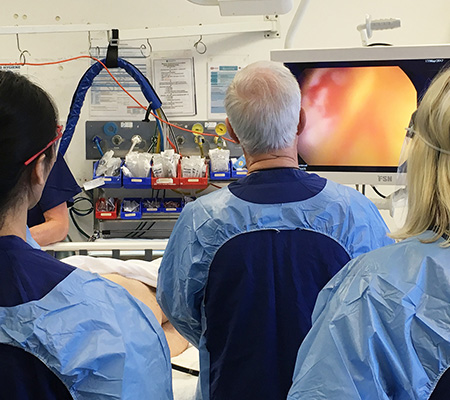Bowel Cancer Australia recommends participating in screening appropriate to your personal level of risk.
For people at average risk of bowel cancer and without symptoms, Australian medical guidelines recommend screening using a faecal immunochemical test (FIT) every 2 years between ages 45-74.
The guidelines state a healthcare professional could consider offering a faecal immunochemical test every 2 years to people aged 40-44 who request screening, after being fully informed of the benefits and potential harms of testing.
Similarly, the guidelines state a healthcare professional could consider offering a faecal immunochemical test every 2 years to people aged 75-85 who are fit, well and healthy and request screening, after being fully informed of the benefits and potential harms of testing.
Talk to your GP or pharmacist today about BowelScreen Australia®
Order a screening test online or by calling 1800 727 336 (SCREEN).
At-home bowel screening involves a test that looks for very small amounts of blood in poo that is non-visible to the naked eye in people who do not have any obvious symptoms of bowel cancer.
The at-home bowel screening test is called a faecal immunochemical test (FIT).
Screening using a faecal immunochemical test is one of the most effective ways to reduce the risk of dying from bowel cancer. The test can detect blood in poo caused from pre-cancerous polyps or from early stage bowel cancer. The test however does not detect bowel cancer itself.
When identified early, almost 99% of bowel cancer cases can be successfully treated.
The faecal immunochemical test involves collecting toilet water or poo samples, placing them on a card or in a container, and mailing them to a pathology laboratory for analysis. The results are then sent back to you and your GP.
A positive test result means blood in poo has been detected. If blood is detected, you should contact your GP immediately to discuss the result and obtain a referral for further investigation via colonoscopy within 30 days.
The presence of blood in poo may be due to conditions other than bowel cancer, such as medications, polyps, haemorrhoids, or inflammation of the bowel, but the underlying cause of the bleeding needs to be investigated by colonoscopy. During the procedure, any polyps can be identified and removed or a diagnosis of bowel cancer confirmed.
A negative test result means blood in poo has not been detected and it is recommended that you repeat the test every 2 years.
However, this does not mean that you do not have, or can never develop, bowel cancer, since some bowel cancers do not bleed or only bleed on and off. In between times, if you develop any symptoms of bowel cancer, see your GP immediately.

| Screening tests have risks
Decisions about screening tests can be difficult. Not all screening tests are helpful and most have risks. Before having any screening test, you may want to discuss the test with your GP or pharmacist. It is important to know the risks of the test and whether it has been proven to reduce the risk of dying from cancer.
False-negative test results can occur
Screening test results may appear to be normal even though bowel cancer is present. A person who receives a false-negative test result (one that shows there is no blood in poo when there really is) may delay seeking medical care.
False-positive test results can occur
Screening test results may appear to be abnormal even though no blood in poo is present. A false-positive test result (one that shows there is blood in poo when there really isn't) can cause anxiety and is usually followed by more tests (such as colonoscopy), which also have risks.











